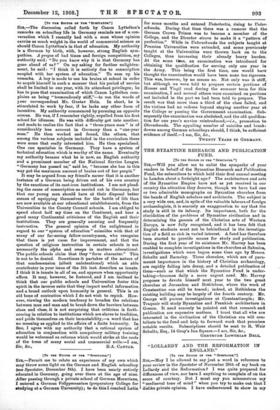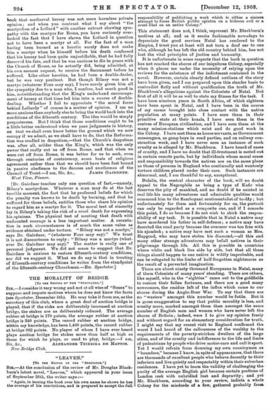" LOLLARDY AND THE REFORMATION IN ENGLAND."
[To TEM EDITOR OP THE "BrzerreoR."] Sin,—May I be allowed to say just a word in reference to your review in the Spectator of November 28th of my book on Lollardy and the Reformation P I was quite prepared for differences of view, nor have I anything to complain of on the score of courtesy. But I must say you misconstrue my "mediaeval tone of mind" when you try to make out that I dislike private opinion. I have endeavoured to show in my book that mediaeval heresy was not mere harmless private opinion ; and when you contrast what I say about "the martyrdom of a Lollard " with another extract showing sym- pathy with the martyrs for Rome, you have curiously over- looked the fact that I have shown the Lollard in question not to have been a martyr at all. For the fact of a man baying been burned as a heretic surely does not make him a martyr when he himself before his death confessed that his heresy had been quite unjustifiable, that he had fully deserved his fate, and that he was anxious to die in peace with the Church of Rome, as he actually did, being admitted, at his own earnest request, to receive the Sacrament before he suffered. Like other heretics, he had bean a double-dealer, but he was very penitent. But though Bilney was not a martyr (whatever Foxe may say), I have surely given him all the sympathy due to a man who, I confess, had much good in him, notwithstanding that the King's underhand encourage- ment of heresy at that time led him into a course of double- dealing. Whether I fail to appreciate " the moral force behind Lollardy" of course is a matter of opinion. I am no more anxious than anybody else to bring the world back into the conditions of the fifteenth century. The idea would be simply preposterous. But I think that those conditions ought to be a little better understood when we pass judgments in history, an that we shall even know better the ground which we now occupy if we admit, as we shall have to do, that the Reforma- tion was cradled in despotism,—that the Church's despotism was, after all, milder than the King's, which was the only power that really cut us off from Rome, and that when we were cut off from Rome, it was better for us to seek, even through centuries of controversy, some basis of religious agreement rather than that we should have been fast bound in passive obedience to the decrees and anathemas of the Council of Trent.—I am, Sir, &c., JAMES GAIRDNER. West View, Pinner.
[Dr. Gairdner touches only one question of fact,—namely, Bilney's martyrdom. Whatever a man may do at the last terrible moment, the fact that he professed beliefs for which the penalty was known to be death by burning, and that he suffered for those beliefs, entitles those who share his opinion to regard him as a martyr for it. The moral test of sincerity lay in Bilney's taking the risk of a cruel death for expressing his opinions. The physical test of meeting that death with undaunted courage is a less important matter. A recanta- tion in such circumstances is of much the same value as evidence obtained under torture. "Bilney was not a martyr," says Dr. Gairdner, "(whatever Foxe may say)." We trust it is not discourteous to reply : "Bilney was a martyr (what- ever Dr. Gairdner may say)." The matter is really one of personal judgment. We did not mean to suggest that Dr. Gairdner is anxious to restore fifteenth-century conditions, nor did we suggest it. What we do say is that in treating of fifteenth-century conditions he writes from the standpoint of the fifteenth-century Churchman.—En. Spectator.]































































 Previous page
Previous page